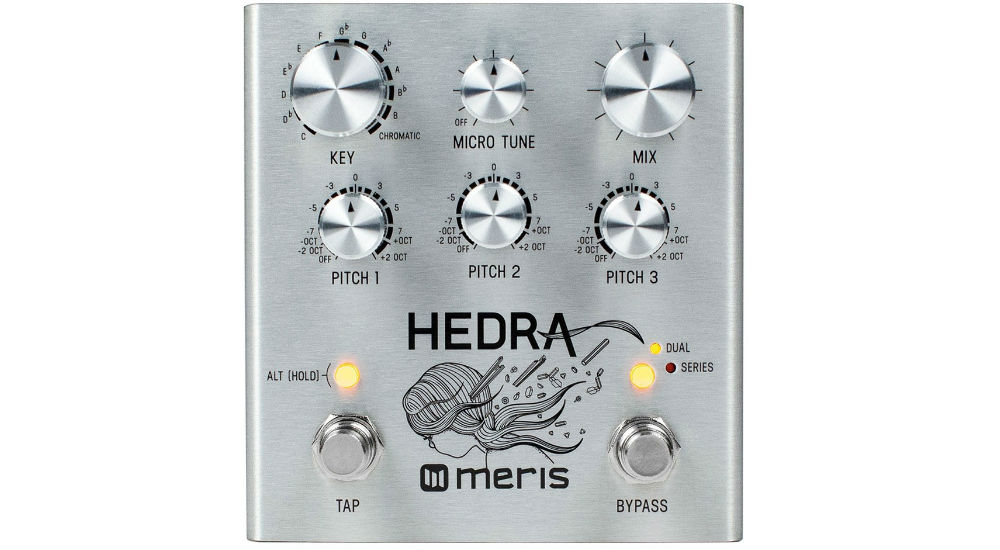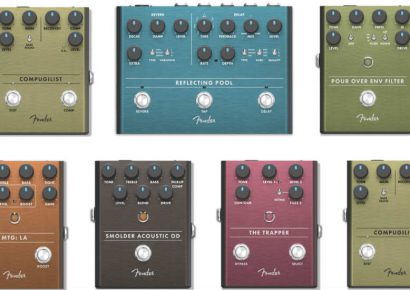The Hedra, a powerful and dynamic triple-voiced rhythmic pitch shifter, aims to bend this perception of ‘pedal’ even further. Named after the fearsome many-headed serpent from the Herculean era of Greek mythos, the Hedra essentially replicates esteemed studio rack units like the Eventide Ultra-Harmonizer or the Rocktron Intellipitch, delivering three voices of mind-melting pitch-shifted tones as well as incredible MIDI functionality and external control via an expression pedal. It’s a serious pedal (with a serous pricetag to match) that should almost be considered more as a studio tool than a mainstay in your gig rig, but it’s portable and rugged enough to sit pretty on your pedalboard should you please. On top of all this, the Hedra even has four built-in delay settings with a tap-tempo footswitch to control the rate of the effect. Honestly, it’s probably as overwhelming as a pedal can get; but with Meris, that’s almost the point.
With three independent pitch controls, a key knob, microtuning capabilities and a mix knob, utilising the Hedra on its surface level is relatively straightforward. The pitch controls allow you to select the intervals of each voice, allowing you to stack three pitch-shifted layers atop of your dry signal. For those looking to dial in an orchestral, wailing lead tone reminiscent of Queen’s Brian May or even Ratatat, this is where the money is, while diming the microtune knob will add in a touch of detuned, warbling modulation. The Hedra also serves up drop-tuned -/+2 octave Whammy style tones with ease, offering a suitable platform to lay down beefy detuned riffs or wild Tom Morello inspired octave leaps for more experimental players.
Exploring the alt-function of each knob and button also unlocks seven scale setting presets, letting you leap up and down the Lydian with ease if you so please. However, it’s worth noting that the Hedra is not a layman’s pedal – without an apt theoretic knowledge and understanding of harmony, the Hedra might simply have you scratching at your head wondering why you’ve just blown your paycheque on this fancy piece of kit. Do the research before you pull the trigger – call in sick for the afternoon and spend a few hours noodling with this in a shop before you make your mind.
After you wrap your head around the harmoniser element of Meris’s new pride and joy, you’ve then got to tackle the rhythmic element of the Hedra. Engaging the delay mode and experimenting with the tap tempo and different modes makes these sounds all the more wacky, woolly and at times unpredictable – but never uninteresting. Alt-pressing and turning each pitch knob also gives you control over the independent delay time of each pitch voicing, stacking up the crazy factor even further. This function delivers astonishing sonic results when you deep dive into it, and after some knob tweaking, you’ll be creating cascading delay runs and jagged synth-like sequences in no time. Once you discover the glide function – yep, that’s a thing – you’ll begin to stop looking at the Hedra as a pitch-shifter, and almost more akin to a powerful synth engine you control with a guitar. Pair it with your own reverb, modulation or volume pedal, and the Hedra absolutely sings; even the simplest of volume swells will blossom into cascading symphonies that will almost certainly leave a tear rolling down your cheek.
As well as offering even more nuanced tweakability by plugging in an expression pedal, the Hedra can also be used to control MIDI keyboards in real time and, for those who care, the Hedra sounds absolutely fat when paired with a synthesiser for mono-synth lines that really matter. I’ve honestly never been so flummoxed by an effects pedal, and while I can’t picture it on many pedalboards in the gigging circuit anytime soon, it’s certainly worth spending some time with. If the Hedra is a mere glimpse of what’s to come, I’m so eager to see what else Meris churns out in the years to come.

